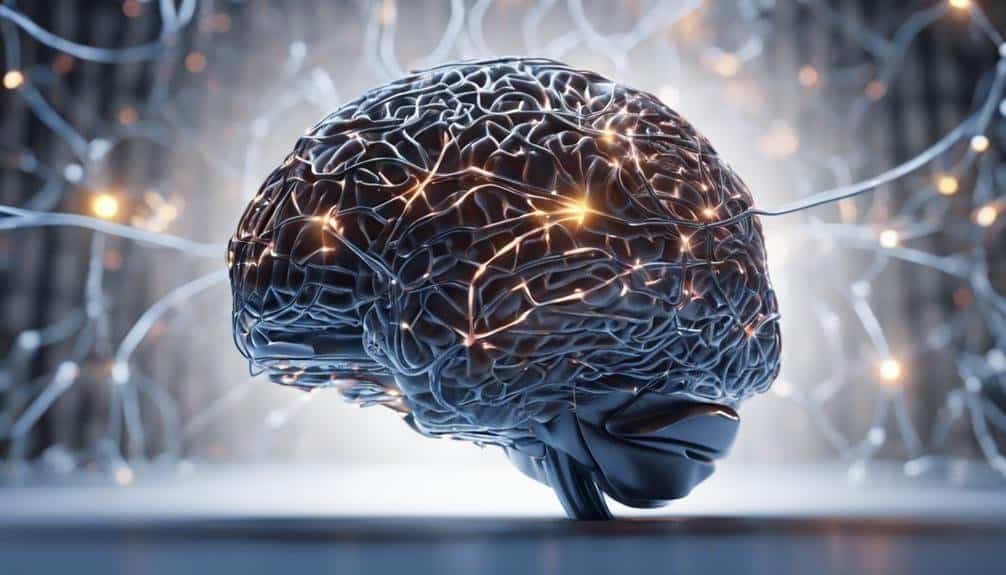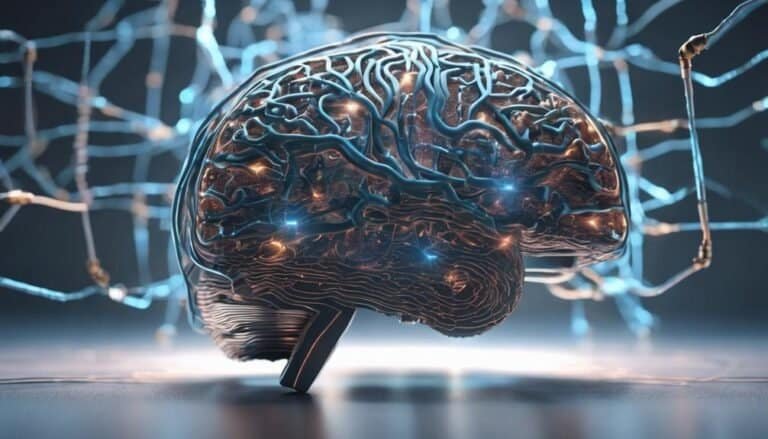Cognitive Computing for Cognitive Enhancement
Embrace the potential of cognitive computing in elevating cognitive abilities to new heights. Imagine a world where technology seamlessly integrates with the human mind to enhance cognitive functions beyond traditional methods.
The synergy between advanced algorithms and the human brain holds promise for unleashing unprecedented mental performance. But how does cognitive computing truly compare to conventional approaches in cognitive enhancement?
Stay tuned to explore the ethical implications, educational implications, and fascinating future prospects of leveraging cognitive computing for unparalleled success in enhancing cognitive capabilities.
Key Takeaways
- Cognitive computing enhances memory retention through advanced techniques.
- It boosts focus and attention span with tailored strategies.
- Accessibility concerns in cognitive enhancement need addressing for inclusivity.
- Decision-making and education benefit from real-time data analysis and personalized recommendations.
The Rise of Cognitive Computing
The emergence of cognitive computing marks a significant advancement in the field of artificial intelligence, revolutionizing how machines process and analyze complex data sets. Cognitive computing advancements have enabled machines to mimic human thought processes, learning from data, identifying patterns, and making decisions without being explicitly programmed. This capability has far-reaching implications for society, impacting various sectors such as healthcare, finance, and transportation.
In healthcare, cognitive computing systems can analyze vast amounts of medical data to assist in diagnosing diseases, predicting patient outcomes, and personalizing treatment plans. This can lead to more accurate diagnoses, improved patient care, and better health outcomes.
In finance, cognitive computing can enhance fraud detection, risk management, and investment strategies by quickly analyzing large datasets for anomalies and trends. This can help financial institutions operate more efficiently and securely.
In transportation, cognitive computing can optimize traffic flow, reduce accidents, and improve navigation systems, leading to safer and more efficient travel experiences for individuals. Overall, the impact of cognitive computing on society is profound, paving the way for smarter, more data-driven decision-making processes across various industries.
Understanding Cognitive Enhancement
As cognitive computing continues to evolve, the exploration of cognitive enhancement becomes increasingly relevant in the domain of artificial intelligence and human-machine interactions. When delving into understanding cognitive enhancement, it's essential to take into account various methods and technologies that aim to improve cognitive functions.
- Brain Training: Engaging in cognitive exercises and activities designed to enhance specific mental abilities.
- Smart Drugs: Exploring the use of pharmaceuticals or supplements that claim to enhance cognitive function.
- Neurofeedback: Utilizing real-time displays of brain activity to teach self-regulation of brain function.
- Transcranial Magnetic Stimulation (TMS): Investigating the use of magnetic fields to stimulate nerve cells in the brain for cognitive enhancement.
These methods offer different approaches to potentially enhance cognitive abilities, whether through training the brain, using substances to boost performance, or employing advanced technologies to modulate brain activity. Understanding the mechanisms and efficacy of these cognitive enhancement techniques is essential for the ethical and effective integration of such practices in cognitive computing and human cognition enhancement.
Applications in Mental Performance
Memory enhancement techniques and focus strategies are vital components of optimizing mental performance. By implementing specific methods to improve memory retention and sharpen focus, you can enhance your cognitive abilities greatly.
Understanding and utilizing these techniques effectively can lead to improved mental acuity and overall performance in various cognitive tasks.
Memory Enhancement Techniques
Utilizing advanced cognitive computing techniques can greatly enhance memory retention and recall abilities in individuals seeking to improve mental performance. When aiming to enhance memory, consider the following techniques:
- Engage in recall exercises and memory games to stimulate the brain.
- Use mnemonic devices to create associations that aid in information retrieval.
- Practice visualization techniques to help encode and retrieve memories more effectively.
- Employ spaced repetition strategies to reinforce memory retention over time.
These memory enhancement techniques leverage cognitive computing principles to optimize memory functions, making the process of learning and recalling information more efficient and effective. By incorporating these strategies into your daily routine, you can boost your memory capabilities and overall cognitive performance.
Focus and Attention Strategies
Enhancing focus and attention is crucial for optimizing mental performance in cognitive tasks and activities. Implementing mindfulness practices and productivity techniques can greatly improve your ability to concentrate. Brain training and attention exercises are also effective ways to enhance your focus and attention span. By incorporating these strategies into your daily routine, you can boost your cognitive performance and productivity levels.
| Mindfulness Practices | Productivity Techniques | Brain Training |
|---|---|---|
| Meditation | Time-blocking | Memory Games |
| Deep Breathing | Pomodoro Technique | Neurofeedback |
| Yoga | Task Prioritization | Cognitive Training |
Cognitive Computing Vs. Traditional Methods
When comparing cognitive computing with traditional methods, one can observe a distinct shift towards more efficient and adaptive problem-solving approaches. Cognitive computing leverages advanced algorithms and machine learning techniques to analyze vast amounts of data quickly and accurately, offering several advantages over traditional methods.
Here are some key points to take into account:
- Adaptability: Cognitive computing systems can adapt and learn from new information, continuously improving their performance over time.
- Speed: These systems can process and analyze data at a much faster rate than traditional methods, leading to quicker decision-making.
- Complexity: Cognitive computing can handle complex and unstructured data sets, making it suitable for tasks that are challenging for traditional approaches.
- Automation: One of the significant benefits is the automation of tasks that would typically require human intervention, increasing efficiency and reducing errors.
Despite these benefits, cognitive computing also faces challenges such as data privacy concerns, ethical dilemmas, and the need for significant computational resources. Balancing the benefits and limitations is crucial for maximizing the potential of cognitive computing in various applications.
Ethical Considerations in Cognitive Enhancement
When considering ethical implications of cognitive enhancement, you must address concerns regarding privacy and data security.
It's imperative to evaluate how access to cognitive enhancement technologies can be distributed equitably to avoid widening existing societal disparities.
These factors play a vital role in shaping the ethical landscape of cognitive computing for cognitive enhancement.
Privacy Concerns
Privacy concerns in the domain of cognitive enhancement stem from the risks tied to collecting and using sensitive personal data. Key issues in this realm include:
- Data Breaches: Unauthorized access can result in misuse of personal information.
- Informed Consent: Users must be fully informed about data usage.
- Anonymity: Preserving individuals' anonymity during data processing is crucial.
- Data Ownership: Ethical questions arise regarding ownership of generated data in cognitive enhancement processes.
Equity in Access
Equity in access to cognitive enhancement technologies is a critical ethical consideration that requires careful examination of distribution and availability across diverse populations.
The concept of accessibility in cognitive enhancement technologies raises concerns about the potential exacerbation of the digital divide. Socioeconomic factors can notably impact an individual's ability to access and benefit from these technologies, potentially widening existing disparities.
It's essential to address these disparities to guarantee fair and equal opportunities for cognitive enhancement across all segments of society. By recognizing and actively working to bridge the gaps in access to such technologies, we can aim towards a more equitable distribution of cognitive enhancement tools, ultimately promoting inclusivity and fairness in the cognitive enhancement landscape.
Enhancing Decision-Making With Cognitive Computing
Enhancing decision-making through the integration of cognitive computing technologies has shown promising potential for optimizing outcomes in various industries. Cognitive algorithms and decision support systems are at the core of this enhancement, providing advanced analytics and insights to aid in the decision-making process.
Here are some key aspects to ponder:
- Real-time Data Analysis: Cognitive computing can process vast amounts of data in real-time, enabling quicker and more informed decision-making based on up-to-date information.
- Predictive Analytics: By utilizing cognitive algorithms, organizations can forecast future trends and outcomes, allowing for proactive decision-making rather than reactive responses.
- Personalized Recommendations: Cognitive computing can offer personalized recommendations based on individual preferences and historical data, aiding in more tailored decision-making processes.
- Risk Assessment: Cognitive algorithms can assess risks more accurately by analyzing complex variables and patterns, assisting decision-makers in evaluating potential outcomes more effectively.
Cognitive Computing in Education
Integrating cognitive computing technologies into educational systems can revolutionize the learning experience by enhancing personalized learning paths and adaptive assessments. By utilizing cognitive algorithms, educational technology can offer tailored learning experiences for students, catering to their individual needs and preferences. Adaptive assessments powered by cognitive computing can provide real-time feedback, allowing educators to monitor student progress more effectively.
| Personalized Learning | Adaptive Assessment | Educational Technology |
|---|---|---|
| Tailored learning experiences based on individual needs | Real-time feedback for educators | Integration of cognitive computing |
| Customized curriculum delivery | Dynamic assessment tools | Implementation of AI in education |
| Adaptive content recommendations | Progress tracking | Virtual classrooms and simulations |
| Student-centered approaches | Immediate performance analysis | Interactive learning platforms |
| Enhanced student engagement | Personalized feedback | Gamification in education |
Future Trends in Cognitive Enhancement
Exploring upcoming advancements in cognitive computing holds promise for further enhancing cognitive capabilities beyond traditional educational applications. In the domain of cognitive enhancement, several future trends are set to revolutionize the field:
- Brain Training Methods: Innovations in personalized brain training programs tailored to individual cognitive needs are on the rise. These methods aim to optimize cognitive functions such as memory, attention, and problem-solving skills.
- Cognitive Enhancement Supplements: The development of novel cognitive enhancement supplements utilizing a combination of natural ingredients and cutting-edge technology is gaining traction. These supplements target specific cognitive domains to enhance mental performance.
- Neurofeedback Technology: Advancements in neurofeedback technology offer real-time monitoring and feedback on brain activity, allowing individuals to regulate their cognitive processes effectively.
- Cognitive Enhancement Devices: The emergence of wearable cognitive enhancement devices, such as neurostimulation headsets, promises to enhance cognitive functions through targeted neuromodulation techniques.
These trends underscore the growing intersection of technology and cognitive enhancement, paving the way for exciting possibilities in augmenting human cognition.
Harnessing Cognitive Computing for Success
Utilizing cognitive computing techniques can greatly enhance operational efficiency and decision-making processes within various industries. Cognitive computing applications encompass a wide range of tools and technologies that simulate human thought processes to solve complex problems. By harnessing these applications, businesses can streamline operations, improve customer experiences, and drive innovation.
One of the key cognitive computing benefits is its ability to analyze vast amounts of data quickly and accurately. This analytical power enables organizations to make data-driven decisions, identify patterns, and predict outcomes with a high degree of precision. Additionally, cognitive computing systems can automate repetitive tasks, freeing up valuable human resources to focus on more strategic initiatives.
Incorporating cognitive computing into business strategies can lead to significant improvements in productivity and competitiveness. Whether optimizing supply chains, personalizing marketing efforts, or enhancing healthcare diagnostics, the potential for success through cognitive computing is vast. Embracing these technologies can propel organizations towards greater efficiency, profitability, and overall success in the modern digital landscape.
Conclusion
As you navigate the complex landscape of cognitive computing for cognitive enhancement, envision a vast network of interconnected neurons firing in ideal synchronization, unleashing the full potential of your mental capabilities.
Embrace the power of state-of-the-art technology to elevate your cognitive performance and make informed decisions with unmatched efficiency.
The future of cognitive enhancement lies in harnessing the capabilities of cognitive computing to achieve success beyond imagination.







